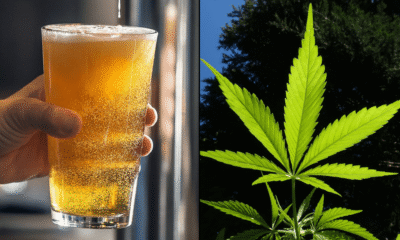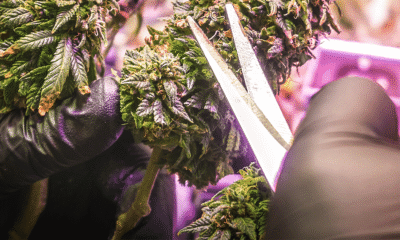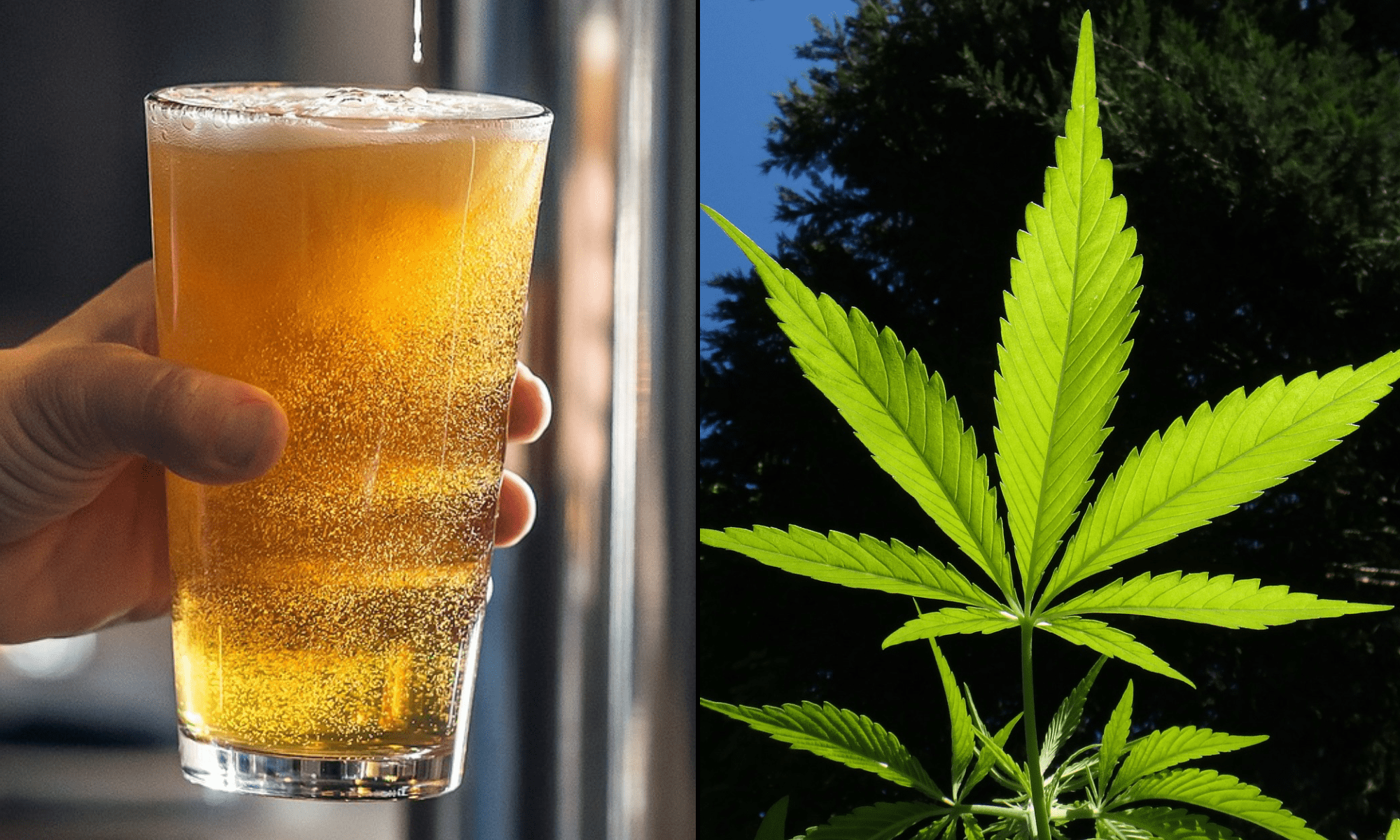featured
Trump Signs Order Targeting Funding For Drug Harm Reduction And Safe Consumption Projects
Published
2 weeks agoon

President Donald Trump has signed an executive order that’s receiving pushback from the drug policy reform community over directives targeting target harm reduction efforts and, specifically, safe consumption programs.
The president’s EO is generally focused on homelessness, but it also includes a number of controversial drug policy proposals to combat the issue that include policies such as prohibiting federal funds from supporting safe consumption sites where people could use currently illicit substances in a medically supervised environment and receive treatment resources.
In one section, the order discusses methods of redirecting federal resources “toward effective methods of addressing homelessness.”
That includes directing the secretary of the U.S. Department of Health and Human Services (HHS) to “ensure that discretionary grants issued by the Substance Abuse and Mental Health Services Administration (SAMHSA) for substance use disorder prevention, treatment, and recovery fund evidence-based programs and do not fund programs that fail to achieve adequate outcomes, including so-called ‘harm reduction’ or ‘safe consumption’ efforts that only facilitate illegal drug use and its attendant harm.”
Another section on “increasing accountability and safety in America’s homelessness programs” states that the HHS secretary and head of the U.S. Department of Housing and Urban Development (HUD) must “take appropriate actions to increase accountability in their provision of, and grants awarded for, homelessness assistance and transitional living programs.”
“These actions shall include, to the extent permitted by law, ending support for ‘housing first’ policies that deprioritize accountability and fail to promote treatment, recovery, and self-sufficiency; increasing competition among grantees through broadening the applicant pool; and holding grantees to higher standards of effectiveness in reducing homelessness and increasing public safety,” it says.
To that end, the EO suggests that federal housing or homelessness assistance recipients should lose funding if they “operate drug injection sites or ‘safe consumption sites,’ knowingly distribute drug paraphernalia, or permit the use or distribution of illicit drugs on property under their control.”
While the federal government hasn’t actively supported safe consumption sites—and, in fact, the Justice Department under both the Trump and Biden administrations challenged the legality of such facilities—the language of this section indicates that even federally supported syringe exchange programs could be jeopardized under the order.
“If our leaders are serious about building safer communities and supporting people struggling with drugs, they must invest in what works: stable housing, overdose prevention, and accessible treatment,” Maritza Perez Medina, director of federal affairs at the Drug Policy Alliance (DPA), told Marijuana Moment. “Yet housing remains out of reach for many—and while it takes just 35 seconds to be arrested for a drug offense, it can take weeks to access treatment.”
“This executive order is alarming—it invites federal interference in local decisions and threatens to punish cities and community groups for pursuing proven public health solutions,” she said. “The potential loss of federal funds to organizations distributing naloxone that reverse a fentanyl overdose, syringes that stop the spread of infectious diseases, or other life-saving overdose prevention tools will only increase the risk of overdose deaths or illness to our loved ones.”
Paul Samuels, president of the Legal Action Center (LAC), said in a press release last Friday that the president’s executive order “promotes the illusion of safety by criminalizing people for being visibly unhoused rather than addressing root causes like the dearth of affordable housing and accessible substance use disorder and mental health care.”
“The approach outlined echoes decades of failed ‘tough on crime’ strategies that have harmed already marginalized communities, especially Black and brown, and wasted huge amounts of money without making anyone safer,” he said.
While the executive order disparages harm reduction policies, there’s at least one top federal health official who has routinely supported such reforms: National Institute on Drug Abuse (NIDA) Director Nora Volkow, who has served over the last several administrations.
In 2022, Volkow tacitly endorsed the idea of authorizing safe consumption sites where people could use currently illicit drugs in a medically supervised environment, arguing that evidence has effectively demonstrated that the facilities can prevent overdose deaths.
The White House drug czar under the Biden administration also said at the time that the office was reviewing broader drug policy harm reduction proposals, including the authorization of supervised consumption sites—and he went so far as to suggest possible decriminalization.
Image courtesy of Dima Solomin.

Author: mscannabiz.com
MScannaBIZ for all you Mississippi Cannabis News and Information.
You may like
-


New Mississippi vape law takes effect in October, only FDA-authorized products allowed
-


More Young Adults Are Opting For Cannabis Drinks Over Alcohol At After-Work Happy Hours, Poll Shows
-


How AI Is Changing The Cannabis Industry
-


12 New York Cannabis Businesses Sue State Over School Proximity Fiasco
-


Massachusetts Auditor Notes ‘Violations’ and ‘Mismanagement’ At Cannabis Control Commission
-


Supreme Court Gives Marijuana Companies More Time To File Petition In Case Challenging Federal Prohibition
featured
More Young Adults Are Opting For Cannabis Drinks Over Alcohol At After-Work Happy Hours, Poll Shows
Published
39 minutes agoon
August 18, 2025
Younger Americans are increasingly using cannabis-infused beverages as a substitute for alcohol—with one in three millennials and Gen Z workers choosing THC drinks over booze for after-work activities like happy hours, according to a new poll.
The survey from Drug Rehab USA assessed the recreational preferences of 1,000 employed adults, finding more evidence that as the marijuana legalization movement achieves greater success and as awareness of alcohol-related harms has spread, a significant portion of those generations are opting for cannabis over booze.
All told, 66 percent of American adults say they’ve tried alcohol alternatives over the past six months. And 24 percent of respondents said they’ve “at least partially” replaced alcohol with non-alcohol or cannabis-based drinks.
That trend is being led by millennials and Gen Z, one of three of whom said they used THC beverages instead of alcohol drinks.
“To unwind after work, 45 percent drink alcohol, while 24 percent use nicotine, 20 percent turn to cannabis, and 16 percent choose alcohol alternatives like mocktails, non-alcoholic beer, or CBD,” the survey found.
“When it comes to winding down after a long day, Americans are reaching for a mix of familiar comforts and emerging alternatives,” Drug Rehab USA said. “While alcohol still dominates, the competition between nicotine and cannabis shows how habits are evolving across generations.”
“After-work rituals are no longer limited to a nightly drink—or even to alcohol at all. From THC-infused beverages to nicotine pouches and non-alcoholic alternatives, today’s habits reflect a broader redefinition of what it means to unwind. While motivations vary—stress, routine, social connection—the through-line is clear: Americans are turning to consumable rituals to draw a line between work and rest. For many, those rituals begin within the hour and recur multiple times a week.”
The survey findings largely track with other research assessing emerging trends in cannabis and alcohol use.
For example, a recent rodent study determined that the cannabinoid CBD reduces rates of binge drinking and alcohol blood concentrations.
Results of a separate study published in the journal Molecular Psychiatry also indicated that a single, 800-milligram dose of CBD can help manage certain alcohol cravings among people with alcohol use disorder (AUD), supporting the use of the marijuana component as a potential treatment option for problem drinkers.
Federally funded research into the effects of cannabis on alcohol use that was published in May also found that people who used marijuana immediately before drinking subsequently consumed fewer alcoholic beverages and reported lower cravings for alcohol.
The study follows a separate survey analysis published in March that found that three in four young adults reported substituting cannabis for alcohol at least once per week—a “fast-emerging” trend that reflects the “rapid expansion” of the hemp product marketplace.
The report from Bloomberg Intelligence (BI) found that, across various demographics, cannabis is increasingly being used as an alternative to alcohol and even non-alcoholic beverages as more companies—including major multi-state marijuana operators (MSOs)—expand their offerings.
The findings were largely consist with a growing body of studies indicating that cannabis—whether federally legal hemp or still-prohibited marijuana—is being utilized as a substitute for many Americans amid the reform movement.
An earlier survey from YouGov, for example, found that a majority of Americans believe regular alcohol consumption is more harmful than regular marijuana use. Even so, more adults said they personally prefer drinking alcohol to consuming cannabis despite the health risks.
A separate poll released in January determined that more than half of marijuana consumers say they drink less alcohol, or none at all, after using cannabis.
Yet another survey—which was supported by the National Institute on Drug Abuse (NIDA) and released in December—found that young adults are nearly three times more likely to use marijuana than alcohol on a daily or near-daily basis.
That poll provided more granular, age-specific findings than a similar report published last year, finding that more Americans overall smoke marijuana on a daily basis than drink alcohol every day—and that alcohol drinkers are more likely to say they would benefit from limiting their use than cannabis consumers are.
A separate study published in the journal Addiction last year similarly found that there are more U.S. adults who use marijuana daily than who drink alcohol every day.
In December, BI also published the results of a survey indicating that substitution of cannabis for alcohol is “soaring” as the state-level legalization movement expands and relative perceptions of harm shift. A significant portion of Americans also said in that poll that they substitute marijuana for cigarettes and painkillers.
Another BI analysis from last September projected that the expansion of the marijuana legalization movement will continue to post a “significant threat” to the alcohol industry, citing survey data that suggests more people are using cannabis as a substitute for alcoholic beverages such a beer and wine.
Yet another study on the impact of marijuana consumption on people’s use of other drugs that was released in December suggested that, for many, cannabis may act as a less-dangerous substitute, allowing people to reduce their intake of substances such as alcohol, methamphetamine and opioids like morphine.
A study out of Canada, where marijuana is federally legal, found that legalization was “associated with a decline in beer sales,” suggesting a substitution effect.
The analyses comport with other recent survey data that more broadly looked at American views on marijuana versus alcohol. For example, a Gallup survey found that respondents view cannabis as less harmful than alcohol, tobacco and nicotine vapes—and more adults now smoke cannabis than smoke cigarettes.
A separate survey released by the American Psychiatric Association (APA) and Morning Consult last June also found that Americans consider marijuana to be significantly less dangerous than cigarettes, alcohol and opioids—and they say cannabis is less addictive than each of those substances, as well as technology.
Meanwhile, a leading alcohol industry association is calling on Congress to dial back language in a House committee-approved spending bill that would ban most consumable hemp products, instead proposing to maintain the legalization of naturally derived cannabinoids from the crop and only prohibit synthetic items.

Author: mscannabiz.com
MScannaBIZ for all you Mississippi Cannabis News and Information.

AI is bringing changes and advancements to most industries – including cannabis
Whether you are a doctor in Nebraska, a restauranteur in Baltimore or senior engineer in Bellevue, Washington, it is upending how you do your job – both good and bad. Most areas of life are being touched and here is how AI is changing the cannabis industry. Artificial Intelligence (AI) is quietly reshaping nearly every corner of modern life, and the cannabis industry is no exception. From cultivation and retail to consumer transparency, AI is bringing new efficiency, accuracy, and trust to a market long been clouded by misinformation and stigma.
RELATED: Marijuana Might Be A Better Hurricane Party Guest
One of the most visible changes is how AI helps consumers track cannabis products. In an industry where strain names and effects can vary widely, AI-driven platforms are stepping in to provide clarity. Apps now use AI to analyze lab results, customer reviews, and even chemical profiles to match consumers with products best suited to their needs—whether it is better sleep, anxiety relief, or a more social buzz. Instead of relying on word-of-mouth or vague descriptions, consumers can access personalized recommendations grounded in hard data.

AI is also helping consumers find accurate, verifiable information in a marketplace which has sometimes struggled with exaggerated claims. Machine learning models can scan thousands of lab tests, regulatory filings, and scientific studies to identify trustworthy patterns. This gives guidance so customers are less likely to fall for marketing hype and more likely to discover which products are safe, effective, and compliant with state rules. For a generation used to researching everything from skincare ingredients to fitness supplements online, AI-driven cannabis insights are a welcome tool.
On the cultivation side, AI is revolutionizing how cannabis is grown. Smart sensors, combined with predictive algorithms, can monitor temperature, humidity, and light in real time. Farmers use these insights to maximize yield while minimizing water and energy use—an especially important consideration in an era of climate concerns and sustainability demands. By predicting plant health before problems arise, AI also reduces the need for pesticides and allows for more consistent harvests.
Retailers are benefiting as well. AI-powered inventory systems can predict which products will sell fastest, helping dispensaries avoid shortages or waste. Chatbots and virtual budtenders are guiding customers through product choices, mimicking the experience of a knowledgeable staff member but available 24/7 online. These digital assistants are especially appealing to Millennial and Gen Z consumers who prefer research-based shopping and minimal in-store pressure.
RELATED: Science Says Medical Marijuana Improves Quality Of Life
Looking ahead, AI could play a role in shaping cannabis policy and public health, too. By analyzing patterns in consumption data, researchers and regulators can better understand how cannabis affects communities, potentially leading to smarter regulations and safer use guidelines. In medical marijuana research, AI is proving especially powerful. Machine learning tools can process vast sets of patient data, clinical trial results, and genetic information to identify which cannabinoids or terpenes may be most effective for specific conditions such as chronic pain, epilepsy, or anxiety. This not only speeds up research but also helps doctors personalize treatment options for patients in ways not possible even a decade ago.
AI is doing more than making cannabis more high-tech—it’s making it more transparent, sustainable, and consumer-friendly. For an industry still overcoming decades of misinformation, which is a game-changing development.

Author: mscannabiz.com
MScannaBIZ for all you Mississippi Cannabis News and Information.
featured
12 New York Cannabis Businesses Sue State Over School Proximity Fiasco
Published
3 hours agoon
August 18, 2025
A dozen New York-licensed cannabis dispensaries are taking regulators to court over a screw-up by the state’s Office of Cannabis Management (OCM) related to their storefront locations being too close to schools.
The 12 petitioners filed the complaint on Aug. 15 in the New York Supreme Court in Albany County, against the OCM and the state’s Cannabis Control Board (CCB) over a school proximity correction that the office issued July 28. The correction, which impacts 108 dispensary licensees and 44 applicants with provisional licenses, intends to realign the OCM’s 500-foot measurement guidelines with state law.
Instead of continuing an entrance-to-entrance measurement between dispensaries and schools from the OCM’s erroneous 2022 guidance, the office now plans to measure the buffer zone from the entrance of a cannabis store in a straight line to the nearest property line boundary of a school’s grounds to move into compliance with New York’s cannabis law.
Following the proximity correction issuance, OCM Acting Executive Director Felicia A.B. Reid sent a letter on Aug. 6 to the 152 impacted businesses, clarifying that the 108 licensees may remain open or continue to work toward opening in their current locations as state officials push lawmakers for a legislative fix to grandfather in their locations. The 44 applicants, meanwhile, will need to move locations and will have access to $250,000 each from a $15 million relief fund to lessen their burdens.
Despite the assurance that the 108 licensees can remain put—and even continue to operate while the OCM delays reviewing any license renewals pending the legislative fix—the petitioners are asking the state Supreme Court in Albany to annul the OCM’s revised interpretation of Cannabis Law § 72(6) and declare that their locations remain compliant under a lawful reading of that law as well as the OCM’s 2022 guidance.
The 12 cannabis businesses are also asking that a State Supreme Court judge issue a preliminary and permanent injunction preventing the OCM from taking any enforcement actions against them based on the office’s new interpretation of the law, forcing the OCM to instead keep its previous interpretation that regulators used to review and approve site plans to issue licenses.
“Relying on those approvals, petitioners poured their life savings into launching their businesses,” the complaint states. “They signed leases, completed build-outs, hired employees and opened their doors to the public under the state’s very detailed framework. But now, in a complete about-face, OCM incredulously claims it got the law wrong all along.”
Furthermore, the petitioners claim that the OCM changed its guidance based on a new interpretation of the law without any formal rulemaking process or public notice. They argue that the informal rulemaking violates the State Administrative Procedure Act and that state officials arbitrarily redefined their own regulations.
Seven of the 12 businesses suing the state are either open or have received their final licensure to open, meaning the state has assured them they do not need to move locations and can remain open even with expired licenses—the OCM indicated it cannot approve their license renewals until state lawmakers act. However, some businesses fear that insurance companies and banks may refuse to service them if their licenses have expired, even in an interim phase.
“Petitioners face numerous collateral consequences as a result of OCM’s unlawful reinterpretation of Cannabis Law §72(6),” the complaint states. “Specifically, petitioners are required as part of their leases to be in compliance with all cannabis laws. OCM’s arbitrary and capricious actions have placed them at risk of falling into material breach with their lessors and, if allowed to continue, will cause them irreparable harm.”
These seven businesses include: ConBud (Manhattan), The Cannabis Place (Queens), Summit Canna (Bronx), Hush (Bronx), High Fade (Manhattan), Housing Works Cannabis Co. (Manhattan) and Common Courtesy Dispensary (Queens).
Meanwhile, the other five petitioners in the lawsuit are cannabis business applicants who received provisional licenses that are not yet finalized and will therefore be forced to pack up and change locations. These businesses include: Rezidue, Elise Pelka, Toastree, Monarch NYC and Luxe Leaf Boutique.
According to the lawsuit, while each of the five applicants has incurred significant buildout expenses, Rezidue, Elisa Pelka and Lux Leaf Boutique have completed their buildouts and were ready to begin operating upon a virtual inspection and gaining final licensure.
The petitioners’ construction costs ranged from $500,000 to $1,000,000, falling short of the $250,000 available per applicant in the state’s relief fund, according to the lawsuit.
“Petitioners have each expended nearly and in some cases over $1 million in preoperational expenses, and several million dollars each in post-operational expenses in reliance of OCM’s assurances,” the complaint states. “If OCM’s new and unlawful interpretation is allowed to remain in force, petitioners will also lose hundreds of thousands of dollars in deposits and lease termination penalties that cannot be recouped.
“Additionally, petitioners have all executed personal guarantees on their commercial leases, which would not only bankrupt the businesses, but also the individuals who guaranteed these leases.”
The petitioners argue that these expenses represent irreparable harm, which the court has the authority to prevent.
Other arguments the 12 cannabis businesses made in the lawsuit include:
- Retroactively revoking their license rights without notice or hearing violates due process;
- The OCM violated the equal protection clause of the state’s Constitution by revoking their proximity protections and thereby allowing competing applicants to gain favorable locations (in addition to the 500-foot school buffer zone, dispensaries must adhere to bigger buffer zones between other dispensaries).
- By pre-emptively denying licensees renewals, the OCM has engaged in unlawful “taking” without affording the petitioners due process of the law by way of a fair hearing;
- The plaintiffs’ investments have been rendered valueless by the OCM’s retroactive policy change, amounting to a “regulatory taking” under the New York Constitution; and
- The OCM’s new interpretation of the state’s cannabis law as it relates to school proximity requirements disproportionately harms those who were already disproportionately harmed by the drug war, which violates the state’s Marihuana Taxation and Regulation Act (MRTA) provisions to prioritize the inclusion, participation and sustainability of equity applicants.
“OCM’s reinterpreted rule disproportionately harms these stakeholders and licensees and undermines the very purpose of this law,” the complaint states about the latter bullet point. “Petitioners do not come from generational wealth and therefore cannot sustain such a hit. Their lives would be shattered while the OCM simply says ‘I’m sorry.’”
In particular, 11 of the plaintiffs are conditional adult-use retail dispensary (CAURD) licensees who were prioritized by the state because their businesses were owned by justice-involved individuals who reside in New York.
The 12th plaintiff is a social and economic equity (SEE) licensee, a category reserved for justice-involved individuals, minority- or women-owned businesses, distressed farmers, or service-disabled veteran-owned businesses.
“Petitioners would experience harm unlike anything they have faced before and would be relegated to levels of crippling debt, the likes of which they could never escape,” the complaint states. “The purpose of the MRTA was to undo these past injustices, not to exacerbate them.”

Author: mscannabiz.com
MScannaBIZ for all you Mississippi Cannabis News and Information.

New Mississippi vape law takes effect in October, only FDA-authorized products allowed

More Young Adults Are Opting For Cannabis Drinks Over Alcohol At After-Work Happy Hours, Poll Shows

How AI Is Changing The Cannabis Industry

12 New York Cannabis Businesses Sue State Over School Proximity Fiasco

Massachusetts Auditor Notes ‘Violations’ and ‘Mismanagement’ At Cannabis Control Commission

Supreme Court Gives Marijuana Companies More Time To File Petition In Case Challenging Federal Prohibition

Canopy USA Appoints New Executive Team to Accelerate Growth

Washington Adult-Use Cannabis Sales Decline for Fifth Straight Year

Delaware Governor Seeks Marijuana Regulation Advice From Colorado Counterpart As State’s Legal Market Launches

Major trucking group’s cannabis rescheduling concerns (Newsletter: August 18, 2025)

From The Vault: The HIGH TIMES interview Allen Ginsberg (1992)

Court throws out part of New York’s marijuana licensing rules

Watch Immigration Enforcement Rattles the Cannabis Industry | SoCal Matters Season 2025

Two arrested as police close four unlicensed cannabis shops in Seneca Falls

High-potency cannabis use linked to psychosis | Watch News Videos Online

High Times Strains Of The Month: August 2025

Texas Crime Labs Say They Don’t Have Enough Resources To Test Hemp Products For THC As Lawmakers Consider Ban

Trump on changes to marijuana policy: 'We're looking at it'

Realtors’ Stolen Credit Cards Are Used to Build an Illegal Marijuana Farm

Grady County Sheriff's Office makes arrests in illegal marijuana bust

High Times Was The Most Influential Publication Of My Life

Revelry NYC 2025: Inside New York’s Cannabis Culture & Industry Festival

Revelry NYC 2025: Inside New York’s Cannabis Culture & Industry Festival

Indian Tribes See Opportunity In Hemp THC Products, Even In States That Continue Marijuana Criminalization

Alert: Department of Cannabis Control updates data dashboards with full data for 2023

Connecticut Appoints The US’s First Cannabis Ombudsperson – Yes there is a pun in there and I’m Sure Erin Kirk Is Going To Hear It More Than Once!

5 best CBD creams of 2024 by Leafly

EU initiative begins bid to open access to psychedelic therapies
New Study Analyzes the Effects of THCV, CBD on Weight Loss

Free delta-9 gummies from Bay Smokes

5 best autoflower seed banks of 2024 by Leafly

Discover New York’s dankest cannabis brands [September 2024]

Curaleaf Start Process Of Getting Their Claws Into The UK’s National Health System – With Former MP (Resigned Today 30/5/24) As The Front Man

May 2024 Leafly HighLight: Pink Runtz strain

Mississippi city official pleads guilty to selling fake CBD products

Press Release: CANNRA Calls for Farm Bill to Clarify Existing State Authority to Regulate Hemp Products

Local medical cannabis dispensary reacts to MSDH pulling Rapid Analytics License – WLBT

Horn Lake denies cannabis dispensary request to allow sale of drug paraphernalia and Sunday sales | News

5 best THC drinks of 2024 by Leafly

Nevada CCB to Accept Applications for Cannabis Establishments in White Pine County – “Only one cultivation and one production license will be awarded in White Pine County”

6 best CBD gummies of 2024 by Leafly

The Daily Hit: October 2, 2024

5 best delta-9 THC gummies of 2024 by Leafly

Weekly Update: Monday, May 13, 2024 including, New Guide for Renewals & May Board meeting application deadline

PRESS RELEASE : Justice Department Submits Proposed Regulation to Reschedule Marijuana

People In This State Googled ‘Medical Marijuana’ The Most, Study Shows

Thailand: Pro-cannabis advocates rally ahead of the government’s plan to recriminalize the plant

5 best THCA flower of 2024 by Leafly
Trending
-

 California Cannabis Updates1 year ago
California Cannabis Updates1 year agoAlert: Department of Cannabis Control updates data dashboards with full data for 2023
-

 Breaking News1 year ago
Breaking News1 year agoConnecticut Appoints The US’s First Cannabis Ombudsperson – Yes there is a pun in there and I’m Sure Erin Kirk Is Going To Hear It More Than Once!
-

 best list1 year ago
best list1 year ago5 best CBD creams of 2024 by Leafly
-

 Business11 months ago
Business11 months agoEU initiative begins bid to open access to psychedelic therapies
-

 cbd1 year ago
cbd1 year agoNew Study Analyzes the Effects of THCV, CBD on Weight Loss
-

 Bay Smokes1 year ago
Bay Smokes1 year agoFree delta-9 gummies from Bay Smokes
-

 autoflower seeds11 months ago
autoflower seeds11 months ago5 best autoflower seed banks of 2024 by Leafly
-

 cannabis brands11 months ago
cannabis brands11 months agoDiscover New York’s dankest cannabis brands [September 2024]




